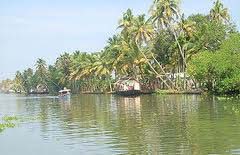 This thesis by Christina Tang for the Center of Environmental Studies, Brown University deals with a study of water quality and attempts to ascertain the net benefits or costs from rainwater harvesting under a variety of scenarios for households in various water supply conditions.
This thesis by Christina Tang for the Center of Environmental Studies, Brown University deals with a study of water quality and attempts to ascertain the net benefits or costs from rainwater harvesting under a variety of scenarios for households in various water supply conditions.
Eighty percent of the 7,00,000 citizens of Kuttanad, a region in the coastal State of Kerala have no access to clean water. In Kuttanad, intensive untreated human sewage and agricultural activities have caused severe surface water contaminations. At the same time, other sources of freshwater are unreliable for drinking: groundwater is acidic due to the soil conditions and iron leaching; freshwater from public tap is infrequent; and water supply from private vendors is extremely expensive.
Of all water sources, rainwater alone satisfies the World Health Organisation guidelines for drinking-water quality. Using both primary and secondary data from water samples and community surveys, this study analyzes the costs and benefits of rainwater harvesting in Kuttanad.
The major costs include the initial construction cost of rainwater harvesting system and the maintenance costs. The major benefits include an increase in household dispensable income, time and energy saved from collecting water and reduction of epidemic outbreaks and associated medical costs.
The study reveals the urgency of water scarcity and sheds light on the potential remediation strategies. The rainwater sample demonstrates a consistently low level of contaminantion in all tested parameters. For the tested parameters in this study, rainwater is the only water source that satisfies all the drinking water standards set forth by the WHO and the Bureau of Indian Standard.
The study concludes that households with different water consumption patterns will benefit positively in various degrees from investing in domestic rainwater harvesting systems. Continuous data collection and research are needed to validate the benefits and costs of rainwater harvesting in Kuttanad.
The report is organized into the following sections –
- Part I: Background and water scarcity in Kuttanad
- Part II: Water quality study
- Part III: Economic evaluation of rainwater harvesting
Image Courtesy: Wikipedia
Download the report here -